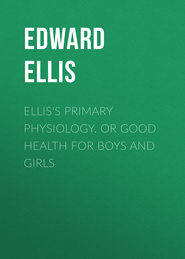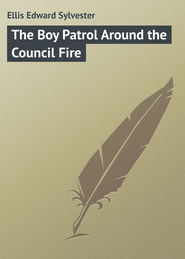По всем вопросам обращайтесь на: info@litportal.ru
(©) 2003-2024.
✖
The Boy Hunters of Kentucky
Настройки чтения
Размер шрифта
Высота строк
Поля
The young hunter's eyes sparkled.
"He's one of the finest animals I ever saw. Hallo! – "
He was looking at the tiny red orifice where his bullet had entered, and from which the life current was flowing, when he saw the feathered tip of an Indian arrow just under the fore part of the buck. Seizing the front legs, he rolled the animal over on the other side.
As he did so he saw that an arrow had been driven into the side of the deer, close to where his bullet had come out.
The wound thus made must have been mortal, though, as you may know, it is almost impossible to fire a shot that will instantly bring down one of these animals.
There could be but one meaning to this-an Indian had shot the buck before Jack fired at it.
"Of course he will claim it," thought the young hunter; "but I am not sure that it belongs to him, for from the way the deer was running it looked as if he was not going to give up for a long time, if indeed he would have fallen at all. But we shall soon know."
The cause of the last remark was the sight of the Indian who doubtless fired the arrow. Jack, on looking at him, saw with pleasure that he was not a full-grown warrior, but a boy who could not have been much older than himself.
The young Indian wore the fringed hunting shirt, leggings, and beaded moccasins of his people, had a row of beads around his neck, a quiver of arrows over his left shoulder, and a long bow in his left hand. In the belt which clasped the waist of his deer-skin hunting shirt were thrust a tomahawk and hunting knife, so that he was as fully armed as most of his people.
The face was broad, with high cheek-bones, small twinkling bead-like eyes, broad thick nose, and retreating chin, the whole daubed with greasy yellow, red, and black paint, in the shape of circles, dots, and all sorts of hideous devices for which room could be found.
From a glance at the colours used in the dress of the Indian and on his countenance, Jack formed the conclusion that he belonged to the Wyandot tribe, many of whom he had met.
The young Indian must have believed he was a terrible-looking fellow, and that no white lad dare dispute him, for he strode along like one who knows he is master, and stopping a few steps away, pointed down at the smitten buck.
"He mine," he muttered, in good English; "me shoot him."
"So I see," calmly remarked Jack. "And I shot him too."
As he spoke he pointed to the place where the ball had left the body, close to the entrance of the arrow. The Indian stooped down, and with some dexterity pushed the latter through the body of the deer, drawing it out on the other side. The head of such a missile, as you can well see, is so fashioned that it cannot be drawn back after being driven into any body.
Rising to his feet, the young Wyandot restored the shaft to its place in his quiver, and repeated his remark:
"He mine; me shoot him with arrow."
Now there was no cause for Jack Gedney having a dispute with the Indian. The latter was welcome to the game, for Jack could do nothing with it, unless to run back home and tell his father to come and claim it. It was within convenient reach, but rather than give the time that this would take, the youth would have preferred to lose several such deer.
He was anxious to join Will and George, who he knew were waiting impatiently for him; but he felt very much as you would have felt had you stood in his shoes. He thought the Indian was trying to bully him, and he was not willing to submit. Had the Wyandot asked him to let him have the game, he would have been glad to do so; but when it was not clear which of the two was the rightful claimant to the prize, the sturdy young hunter did not mean to be dictated to by a young Indian whose face was painted like his. Before yielding he would resist him.
CHAPTER VI.
THE WRESTLING BOUT
"Now, see here," said Jack; after the young Indian straightened up, "you have told me more than once that that deer is yours. I don't know whether it is or not, for the creature didn't fall till I shot him-"
"He mine! he mine!" interrupted the other, laying his hand in a threatening manner on his knife. "My name Arowaka-me Wyandot; father, Hua-awa-oma-he great chief!"
"He may be a great chief among his own people, but you won't find him of much account among white folk. What I meant to say, Arowaka, is that your saying that the game is yours doesn't make it yours. You have your hand on your knife. I have a knife too, and I am not afraid of you."
The young Wyandot showed by his manner that he was surprised. Clearly he did not expect such a rebuff as this, and, though his swarthy hand still rested on his weapon, he did not draw it forth.
"What is your bow good for, any way?" continued Jack, with a smile at the primitive weapon. "You Indians can't do half as much with your bows and arrows as we can with our guns. I killed two painters with my rifle last night, and I'll warrant that that's more than you ever did in all your life."
At this point it struck Jack that he would do a foolish thing to engage in a quarrel with the young Indian over the ownership of so small a thing as the carcase of a deer. Since he had not only defied the other, but forced him to pause in his demands, the white youth felt more kindly towards him.
"See here, Arowaka," he added, "I think I have as much right to the game as you, but I don't want it half as bad. I'll let you have it. Why don't you pick it up and carry it off?"
The Wyandot, who must have understood these words, looked at the speaker with a curious expression, that is, so far as it could be seen through the paint with which his face was daubed.
"What your name?" he asked, in a lower voice than before.
"Jack Gedney, and I live only a short distance up the path yonder."
"Me know," said the other. "Jack have fine gun."
"You are right about that," was the proud answer of the lad.
"Me like see him."
Jack was too wise to trust his valuable weapon in the hands of the young scamp, who would be glad enough to steal it. Still, he thought it safe to let him have a better view of it than he could have so long as it was held in the two hands of the owner.
So our young friend was foolish enough to compromise. He leaned his gun against the nearest tree, where the eye could trace its whole beautiful shape, from the muzzle to the lowermost corner of the ornamented stock.
Jack took care to stand quite close to the piece, so that, if the young Wyandot should make an attempt to seize it, he could be ahead of him.
To the surprise of Jack, the Wyandot, instead of advancing towards the weapon, moved back several paces, just as a person does when he wishes to view all the points of some large object.
"He knows better than to try to take it from me," was the conclusion of Jack, "for I would fight him like a painter, and I would never give up that gun except with my life."
At this moment came the greatest surprise of Jack Gedney's life. He was looking admiringly at his weapon when the hand of an Indian warrior softly reached from behind the tree, and grasped the barrel. An instant later the figure of a Wyandot stepped into sight, holding his bow in one hand and the captured rifle in the other.
No one can imagine the consternation of Jack Gedney, who had allowed his prize to pass from his possession without so much as raising a finger to prevent it. It looked indeed as if the young Wyandot had been trying to get him to do the very thing that he had done. This, however, could not have been the case, for two Indians must have felt able to overcome so young a lad as Jack, even with his loaded gun.
Jack could hardly keep from crying, for his grief overflowed. The next instant he was filled with anger.
"That is mine," said he, stepping towards the Indian, and reaching out his hand.
The savage extended the weapon, as if he meant to pass it back to the lad; but before the latter could seize it it was withdrawn, and the Indian grinned more than ever.
The warrior was dressed similarly to Arowaka, the paint on his face being daubed in much the same fashion. From this, and the fact that several glances passed between the two, Jack Gedney rightly concluded that they were father and son, the warrior being Hua-awa-oma, who, as his offspring claimed, was a great chief.
"Want gun?" asked the savage, speaking for the first time.
"Yes, it is mine. I must have it! I will have it!"
In his indignation, Jack was ready to draw his knife, and leap at his tantalising enemy. Such a step could not have helped him, while it might have caused him much harm.
Hua-awa-oma showed that, like many an American Indian, he had a vein of waggery in his composition. The race to which he belonged is probably the most melancholy in the world, but there are times when its people show something akin to mirth. The chief set the gun against the tree where it was standing a few minutes before, and then beckoned to his son to come nigher.
Arowaka walked forward until he stood near the wondering Jack Gedney.











